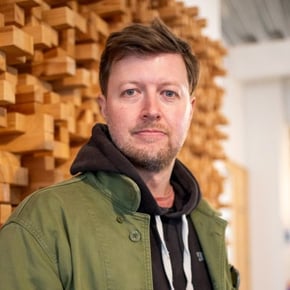Chris Page, Postgraduate & Digital Learning Lead at dBs, explains how he went from a world-touring DJ with DC Breaks to an educator helping our postgraduate students find their feet in the industry.
When I first started out in music, all I wanted to do was make dance-floor D’n’B tunes that hit hard and to play them out to as many people as possible. That was the dream, and eventually, for me, it was the reality. Touring as DC Breaks, releasing music with RAM Records and performing around the world opened up some incredible opportunities in the industry for me. But if there’s one thing you can count on in any career, it’s change; you change, the music changes, the technology, the people, and even the rules of the game change.
Change can unfold gradually and almost imperceptibly, or arrive suddenly and reshape everything, as we all discovered during the pandemic. No one was really prepared for how the pandemic would impact the world, let alone the music industry. Although it became the catalyst for change in my career, looking back, that moment wasn’t a crisis, it was a transition. I began to recognise that I’d picked up a broad set of transferable skills throughout my career, things like music production, content creation, collaboration, and managing projects. I’d also learnt more about business, social media, and even web development, often just out of necessity. I’d already been doing ‘professional development’, I just hadn’t labelled it that. All I needed, it turned out, was the right vehicle to channel those skills into something new. That “something” was a career in higher education at dBs Institute.
Navigating Change
The shift from artist to educator wasn’t about leaving the music industry, it was about redefining my role in it. I had already been creating tutorials to help market my digital products business (“Don’t sell, teach!”), so when the opportunity to do something similar at dBs came up, it felt like a logical progression. Today, that journey has led to my current role as Postgraduate and Digital Learning Lead at dBs Institute, where I now help others shape their careers in music production.
Over the last four years at dBs, I’ve had the privilege to help students from different backgrounds all around the world take their careers and skills to the next level. For any practising, working musician or audio professional, the idea of doing a master’s degree might feel like a retrograde step. But in my experience, it’s exactly the opposite. It allows you to build on your existing experience, develop new creative and professional skills, refine your portfolio and uncover opportunities you may not have previously considered.
What a Master’s Can Actually Do for You
A postgraduate course isn’t just an academic exercise, it’s a springboard to the next phase of your career. At dBs, I’ve seen students use their time on the MA to build their own audio enterprises, create modular synths, guitar pedals, and audio plugins. Others have developed the technical and professional skills to progress in their existing roles. Some have fulfilled their ambition of working full time in music, establishing themselves as successful producers, DJs, and performers (link these to relevant student stories?) Crucially, they do all this in an environment that encourages critical reflection and innovation alongside technical excellence. It’s the kind of space I wish I’d had access to earlier in my own career.
One of the biggest lessons from my own journey is that the skills we develop in music - technical, creative, interpersonal - are highly adaptable. Project management? That’s delivering an album project. Communication? That’s networking, label meetings, and collaboration. Research? That’s teaching yourself how to make a D’n’B track from scratch only using sine waves, make your own plugin or train an AI to make neurofunk bass.
But when you step back and name those skills and place them in a wider professional or academic context, it unlocks opportunities. For me, that meant moving into higher education. For others, it might mean working on BAFTA award-winning documentaries, developing new game prototypes or exploring social issues through immersive audio-visual projects. A master’s course gives you the space and the challenge to take your career to the next level. It validates your experience, sharpens your thinking, and connects you to a community of practitioners asking the same question: what’s next?
Redefining Success
Working in music doesn’t have to mean doing one thing forever. In fact, for most of us, that’s not even sustainable. The real challenge, and opportunity, is to build a career that can evolve with you. For me, that evolution involved moving from the stage to the lecture theatre, from sound design to curriculum design, and from working on my next release to helping others make a success of theirs. I still make tunes and do gigs, but now I also shape the future of the industry by supporting the next generation of artists, producers, and professionals.
If you’re wondering how to future-proof your career, explore new directions, or deepen your creative and professional practice, a master’s degree might be more relevant than you think.



